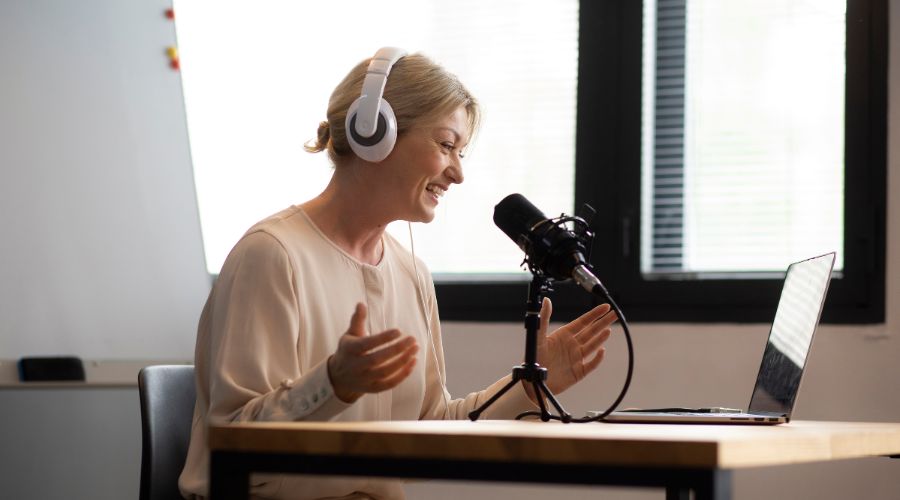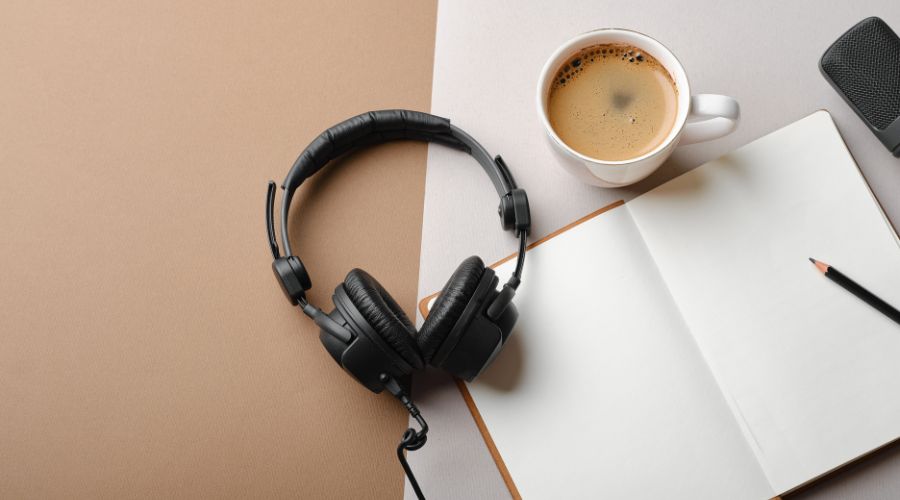Best Podcast Tips For Beginners
Are you considering launching your podcast? Feeling like you need some quick podcast tips for beginners? You’ve come to the right place honey. Podcasting is honestly one of the best and most enjoyable ways to create content. So if you’re thinking about launching your show, we want to encourage you to do so! It’s not only the right time to launch a podcast, it’s also a great way to create a lifestyle and business you love and enjoy. And honestly, who doesn’t want that?
Podcasts’ sudden rise to fame is no surprise. With the way the world is now functioning, this format has become incredibly popular. Podcasts have a variety of benefits, and being able to multitask is one of the most important. Listeners can easily tune in to a podcast while commuting, cooking, washing, or any other mundane everyday activity. In fact, statistics show that a little more than half of the popular podcasts played every day are by people idling at home, around 15.6 percent of audiences listen to podcasts when they are driving or traveling, 17.7 percent listen to podcasts when doing housework, and the rest while they are working out ( source ).
The Best Podcast Tips For Beginners
Podcasts give a deep insight into the workings of industry leaders and make listeners feel as if they are a part of something bigger than themselves. But how do you as the one recording the episode create that kind of high-quality audio experience? Starting a podcast is relatively easy, as almost anyone can do it. The secret is in managing to do it well. Even if it’s simple, you should be properly prepared to create a quality podcast setup and carry on with the show despite any beginner’s jitters.
So in honor of that, today we are sharing our favorite podcast tips for beginners! These are all useful bits of advice that will help you through your podcasting journey.
Plan It Out
A well-thought-out plan of how to work your way around a podcast can help you smooth out any kinks in the process that make podcast recording a hassle. For instance, you can include in the plan what you want to talk about, how many episodes you plan on releasing, and when they are scheduled to launch. Schedules may sound boring, but they help you keep publishing consistently. Have a clear idea of what you want to convey with each podcast you put out.
There are a lot of different ways to build your podcast starter kit. But remember one thing, find what works for you. Plan out finding equipment to work with your voice and inflection, scheduling that fits your lifestyle, and of course any marketing attempts. You’ll be much better off that way!
Choose A Good Podcast Name
Choosing the perfect podcast name can be overwhelming. After all, your podcast name is the first impression listeners will get of your show. There are tons of different ways to hone in on the perfect name for your podcast. Use this guide for how to name a podcast and you’ll end up with an epic name!
Focus On Creating Quality Podcast Episodes
While this one may sound obvious, most podcasters lose out on audiences because they have made silly mistakes along the way. You might end up focusing on the podcast’s name, title artwork, and publishing date, then lose sight of the most important thing: the podcast itself. And no matter how good your first few attempts are, it will take you some time to churn out high-quality episodes (and that’s okay). Rome wasn’t built in a day. And the only way to get to that level is to keep recording. It’s also okay to make your mistakes in the first few podcasts. Very few people will be tuning into them anyway.
Be Vulnerable & Personalize It
As mentioned above, a podcast’s main claim to fame is how intimate you can get with the audience listening to you. Podcasts are ideal for relating personal stories, life-changing events, and funny anecdotes. This is your safe space- allow yourself to be vulnerable, to be your true self. The whole point of starting a podcast is to be an original voice in the airspace. Try not to imitate others. They already have a podcast. People will listen to you and heed your advice if they see you’re an honest, no-nonsense podcaster.
Get The Best Podcast Equipment
While this doesn’t mean spending a fortune on building a ‘studio,’ it makes sense to invest in some quality high podcast equipment like a wide-range USB microphone and other audio-quality enhancing equipment. You want your sound quality to be top-notch, so make sure that whether the equipment is new or refurbished, it works and works well! A good USB microphone, a headset, a good audio interface, and/or a solid DAW (Digital Audio Workstation) may make a substantial difference in the quality of the audio files you record. This can make recording and editing much easier. After all, a podcast that no one can hear properly is better not listened to at all.
You should also look for smaller pieces of podcasting equipment that will simplify your process! A solid shock mount, a mic stand, or a high-quality boom arm can make all the difference. Because who wants to hold their microphone for an hour or two?
Use This Checklist For Starting A Podcast
There is a lot to think about when starting your podcast. So instead of flying blind, use this list of what you need to start a podcast. Whether it’s something simple like a logo, curating a good quality podcast setup, or something more time-consuming like your first few episodes recorded. There is a lot that goes into a podcast starter kit so use this helpful guide and make sure you’re good to go!
Know Your Target Audience & Give Them a Reason to Listen
Every podcast should have a purpose and a way to appeal to your desired audience niche. You’re delivering value to your podcast listeners, whether you’re sharing knowledge that will help them eat healthily or making a really fun conversation with one of your favorite travel bloggers. Knowing what your target audience is interested in is the key to creating content they want to listen to. Talk about topics they are interested in, feature businesses they would purchase from, and most importantly introduce guests they would love. More on how to get guests for your podcast HERE.
You’ve not only provided your target audience a reason to tune in, but you’ve also given them a reason to return for more. It’s crucial to consider this during the podcast development stage.
Create A Compelling Title And A Visually Appealing Cover
Your podcast cover art is among the first things people look at. As a result, it’s a good idea to come up with something that properly embodies what your podcast is all about. Take some time exploring till you’ve come up with something you like. If you are not the best with graphic design, you can also use a designer whose aesthetic appeals to you and complements your unique brand. Have a strong vision of how you want your image to look, and take the time to provide precise guidelines and perhaps an artistic draft.
Upload Your Podcast To A Host Site
If a podcast isn’t available online for podcast listeners to tune in, it isn’t a podcast. As a result, make sure you have a platform that your target audience frequents. Don’t be hesitant to spend a little on your podcast. Find a platform with many features and a great, easy-to-find domain to help boost the number of people who listen to your podcast. Upload or distribute your podcast on other platforms like iTunes, Google Music, or SoundCloud to gain greater exposure. You can also be more accessible to podcast listeners with an RSS podcast feed (commonly referred to as just RSS feed) with which they can subscribe to your podcast and listen to it without having to visit the specific website where it is hosted.
Follow A Framework
When you record a podcast without a framework, you risk going off-subject and babbling about something completely unrelated. The podcast content should contain an opening, core, and conclusion, just like a blog piece. You don’t need to prepare a screenplay that you read word for word, simply a bullet point summary of what you’ll say and when. You may always pause and return to your outline to get back on track if you get off course. While speaking about something else for a couple of minutes can give your podcast more personality, you must know when to return to the topic in question. Keep in mind too, the more your practice, the better you’ll get. So over time, you can rely on your framework notes less and less. However, when you’re just starting make sure you have some guidelines!
Have A Professional Intro and Outro
A polished introduction and outro will give your podcast more credibility and also provide a sense of consistency to your target audience. It can be a smart move to hire a pro to produce your intro and outro – unless you are savvy with audio editing. Ask around to see if anyone can introduce you to a sound editor or scout freelancing platforms for the best talent. Podcast listeners will hear your professional intro and notice you take the show seriously. It’s all about the details!
Be Authentic and Speak Clearly
Everyone just wants to hear what you have to say. So speak clearly, slow down, and take your time. If you need to stop and take a breath, do it. All you can do is be yourself. So don’t stress too much about how you sound, if you’re using the right words, etc. Just be yourself and focus on speaking as clearly as possible. Find yourself a high-quality shock mount to help you avoid any low-frequency rumbles via your microphone. It’ll change the game in terms of picking up all of your words more clearly!
Another piece of speaking clearly comes from microphone placement! So make sure that if you have a boom arm or a mic stand that they’re placed in that sweet spot for picking up all of your audio.
Learn A Bit Of Audio Editing
If you’re not with a production company, you’ll need to figure out how to edit your podcast. Mistakes are inevitable. Sometimes there’ll be an overly long pause, or maybe your sound quality is just a little bit off. You’ll want to have the know-how to fix anything you or your guests want edited out. You can hire someone to help with editing, or you can try it yourself. Of course, you’ll need to learn the basics of audio editing! Your audio editing and recording software, also known as DAW or Digital Audio Workstation, will be your new BFF if you learn to master it along with your audio interface. There are tons of free options for podcasting beginners that have everything you need to start.
If you are ready to invest in a paid service, Adobe Audition is a great choice. But there’s no need to spend money on software right off the bat. A free alternative will cover the basic edits. Here’s a list of the best free podcast editing software so you can choose the best platform for you.
Promote The Show On Your Social Media
This might seem like a no-brainer, but we had to mention it! Don’t be afraid to blast your new show out on social media. And get used to promoting new episodes each week too! You should be proud and excited! Plus remember you’re creating content the audience will hopefully be interested in. So they’ll want to stay up to date on all the details.
You can even find fun and creative ways to get your audience more involved. Let them know which guests you have lined up in upcoming episodes. Ask them to send in their questions for you to ask the guest. There are tons of ways to make your audience feel like a part of the process through social media.
Ask Your Listeners To Subscribe And Leave A Review
When Apple podcasts receive a lot of positive feedback, they are featured in iTunes’ “New and Noteworthy” and top podcast list sections. Always remind your listeners to subscribe and write a review if they enjoyed the episode before the end of every episode.
Be Consistent
When it comes to having a great podcast, consistency is crucial. One of the biggest mistakes beginner podcasters make is they skip weeks, months, etc. in their podcasting schedule. Make a timetable that you can stick to, and stick to it completely. Your audience wants to know that they can count on you to release a podcast on a routine basis. You want them to expect a new episode each day, week, or biweekly, etc. so they know when to tune in. You and your audience are in a relationship. They need to understand that you can be trusted. You can begin to establish attachment with your listeners by providing them a sense of assurance that you are there for them.
A haphazard and inconsistent podcasting timetable will quickly make you lose the ear of the audience. Your podcast should be something that becomes a part of the audience’s everyday life.
What are your podcasting tips for beginners?
Are you a podcaster? Have you launched your show or been recording and releasing episodes for some time now? We would love any tips you can share with our audience below.
Podcasting is unquestionably here to stay. Podcasts are simple to find and listen to, and take very little work on the listener’s part. So if you’re reading to launch your show, there is no time like the present, and have so many benefits for both you and your brand. They’re a superb branding instrument as well as a great marketing tool. It’s a good idea to keep the recommendations above in mind if you’ve wanted to launch a successful podcast.



















